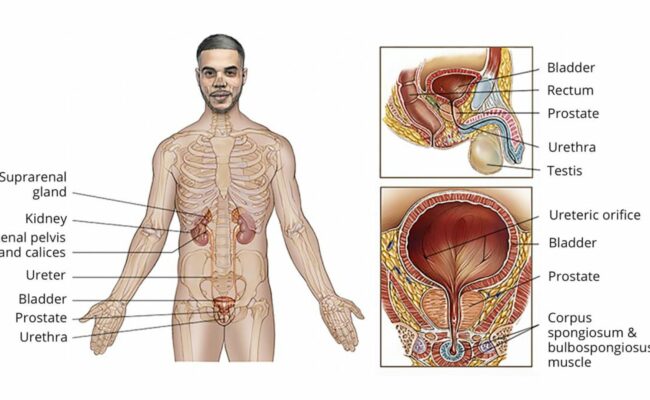Aggressive Prostate Cancer: What You Need to Know

Aggressive Prostate Cancer: What You Need to Know
Prostate cancer is a common health concern for men, affecting millions globally. It arises in the prostate gland, a small, walnut-sized gland that sits below the bladder and is responsible for producing seminal fluid. While many prostate cancers grow slowly and may not cause significant health problems, some forms are more aggressive. Understanding these aggressive subtypes is crucial for early detection and effective treatment.
Let’s delve deeper into the importance of recognizing aggressive prostate cancer.
Also Read: Feeling Tired? Superfoods to Fight Fatigue
Symptoms of Aggressive Prostate Cancer
Early detection is critical for successful treatment of aggressive prostate cancer. While some men with aggressive prostate cancer may not experience any symptoms, others may exhibit various signs. Here’s a breakdown of common symptoms to be aware of:
- Urinary Changes: These are frequent indicators and can include:
- Frequent urination, especially at night (nocturia)
- Difficulty starting or stopping urination
- Burning sensation during urination
- Weak or slow urine stream
- Blood in Urine (Hematuria) or Semen (Hematospermia): The presence of blood is a potential sign, although it can also arise from other conditions.
- Erectile Dysfunction: Difficulty achieving or maintaining an erection can be a symptom of aggressive prostate cancer.
- Bone Pain: Particularly in the lower back, hips, and thighs, this pain arises when cancer spreads to the bones.
- Pain in the testicles or groin
- Unexplained weight loss
It’s important to remember that these symptoms can also occur with less aggressive prostate cancers or other health problems. However, if you experience any of these symptoms, particularly if they are new or worsening, it’s vital to see a doctor to get a diagnosis. Early detection offers the best chance of successful treatment for aggressive prostate cancer.
Treatment Options
When faced with aggressive prostate cancer, various treatment methods come into play. Each approach has its strengths and weaknesses, and the optimal choice depends on several factors, including the cancer’s stage, a patient’s overall health, and personal preferences. Here’s a breakdown of some common treatment options:
Surgery: This might involve a radical prostatectomy, where the entire prostate gland is removed. In some cases, surgeons may also remove nearby lymph nodes.
Radiation Therapy: High-energy beams target and destroy cancer cells. Radiation can be delivered externally, aiming the beams at the prostate from outside the body, or internally (brachytherapy), where radioactive implants are placed directly in the prostate.
Hormone Therapy (Androgen Deprivation Therapy): Prostate cancer thrives on testosterone. This therapy reduces testosterone levels, hindering cancer cell growth. It can be achieved through medication or surgery to remove the testicles.
Chemotherapy: Powerful drugs attack and kill cancer cells throughout the body. Chemotherapy is often used when cancer has spread beyond the prostate or has recurred after other treatments.
Immunotherapy: This harnesses the body’s immune system to fight cancer. While still under development for prostate cancer, immunotherapy medications help the immune system recognize and destroy cancer cells.
Targeted Therapy: These drugs target specific abnormalities within cancer cells, aiming to disrupt their growth and spread. Targeted therapies are a promising area of research for aggressive prostate cancer.
It’s important to note that these treatments can often be combined for a more comprehensive attack on the cancer. Additionally, clinical trials are constantly exploring new and innovative treatment options.
Remember, this information is for general knowledge only. Consulting a qualified urologist is essential to determine the most appropriate treatment plan for aggressive prostate cancer.
Also Read: 6 Tips to Slow Down Aging
Prognosis and Survival Rates
A diagnosis of aggressive prostate cancer can be daunting, but advancements in medicine offer hope. Prognosis, which refers to the chance of recovery, is influenced by several factors. Here’s a breakdown of key elements impacting prognosis and survival rates for aggressive prostate cancer:
Cancer Stage: This is the primary factor. Early-stage detection, where cancer is confined to the prostate, offers a significantly better prognosis than advanced stages where cancer has spread to lymph nodes or distant organs.
Gleason Score and Grade Group: Biopsy results provide a Gleason score, indicating the aggressiveness of the cancer cells. A higher score suggests a faster-growing cancer. The Gleason score is used to calculate a Grade Group, which further refines the risk assessment.
PSA Level: Prostate-Specific Antigen (PSA) is a protein produced by the prostate. While elevated PSA doesn’t always indicate cancer, a high or rapidly rising PSA can suggest a more aggressive form.
Overall Health: A patient’s general health significantly impacts treatment options and prognosis. Those with good overall health can tolerate more aggressive treatments, potentially leading to better outcomes.
Treatment Response: How well the cancer responds to treatment plays a crucial role. A good response to therapy often translates to a better prognosis.
Age: Younger men tend to have a more favorable prognosis compared to older men diagnosed with aggressive prostate cancer.
Availability of Advanced Treatments: Access to newer treatment options, such as targeted therapies and advanced radiation techniques, can improve survival rates.
While survival rates are often presented as statistics, it’s important to remember they are estimates and don’t reflect individual cases. Consulting a doctor about your specific situation is crucial for understanding your personal prognosis.
Clinical Trials
The fight against aggressive prostate cancer is constantly evolving, and clinical trials play a pivotal role in this advancement. These trials test the effectiveness and safety of new treatment approaches, paving the way for improved patient outcomes.
Here’s why clinical trials are so important:
Developing New Therapies: Clinical trials evaluate promising new drugs, radiation techniques, surgical procedures, and treatment combinations. The data gathered helps determine if these approaches are safe and effective for aggressive prostate cancer patients.
Improving Existing Treatments: Trials can refine existing treatments, such as optimizing radiation dosages or exploring new drug combinations to enhance effectiveness and minimize side effects.
Personalized Medicine: Clinical trials sometimes focus on targeted therapies specific to genetic mutations found in an individual’s cancer cells. This personalized approach holds immense promise for the future of cancer treatment.
If you’re interested in participating in a clinical trial for aggressive prostate cancer, here are some resources to help you get started:
Talk to your doctor: They can assess your eligibility for trials based on your specific medical history and cancer characteristics.
National Cancer Institute (NCI) website: This comprehensive resource provides a searchable database of clinical trials across the US.
Prostate Cancer Advocacy Groups: Organizations like ZERO – The End of Prostate Cancer and Prostate Cancer Foundation offer patient resources and information on ongoing clinical trials.
Participating in a clinical trial can be a rewarding experience, contributing to the advancement of cancer treatment while potentially gaining access to the latest therapies. However, it’s crucial to carefully consider the potential risks and benefits involved before making a decision. Discuss all your questions and concerns openly with your doctor to determine if a clinical trial is the right option for you.
Also Read: 6 Fitness Apps That Make Things Easier
In Crux
Aggressive prostate cancer, while serious, is no longer an automatic sentence. Early detection, a variety of treatment options, and ongoing research offer hope for a positive outcome.
By staying informed, proactive, and connected to your healthcare team, you can empower yourself to manage aggressive prostate cancer and take charge of your health journey.
How much did you like Our detailed Aggressive Prostate Cancer? Please share your view in the comment box. Also, please share these Blogs with your friends on social media.
Recommended
RELATED ARTICLES

Buspar and Alcohol Interaction

Ubrelvy Side Effects: Risks and Benefits

How Swimming Strengthens Abs

Best Nutrition Guide for Runners

Understanding Suprapubic Pain

Keto-friendly Meal Ideas!











